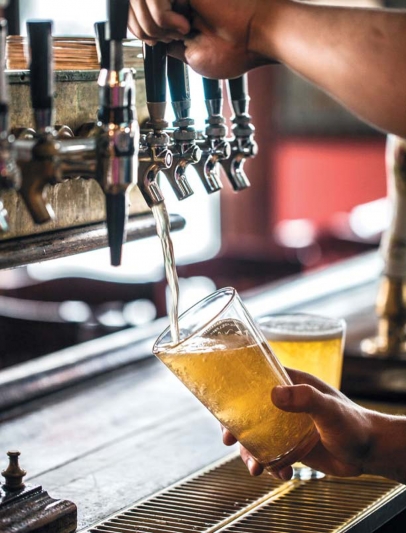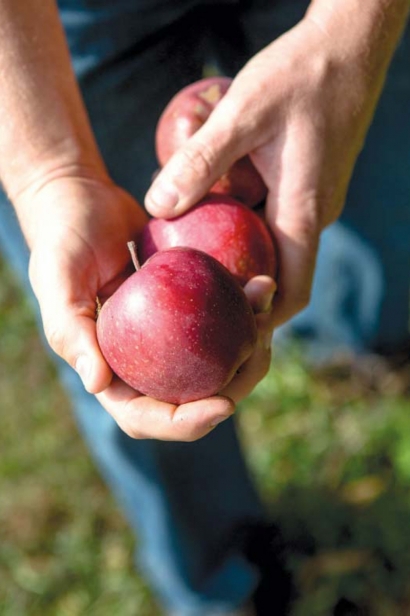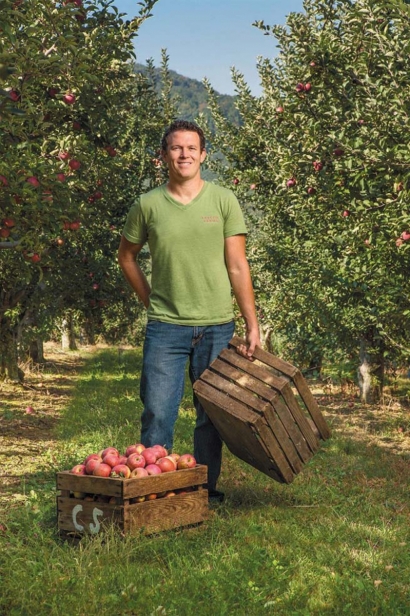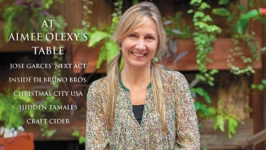A Tall Glass of Autumn
Photography by Michael Persico
It can take seven years to grow an apple tree on healthy root stock—but cultivating the sometimes ugly heirloom apples that make for great hard cider is not the truly time-consuming part of a modern cider maker’s work.
“It’s really going to take time to change the American palate,” says Frecon Farms’s Steve Frecon. Steve is on the front lines of the artisanal cider industry, driving from his Boyertown orchard and cidery to farmers’ markets and festivals throughout the state, where the third-generation farming family is reintroducing Pennsylvanians to traditional hard cider.
Wait, you’re thinking now, I know what cider is. It’s Woodchuck or Strongbow or Crispin or Angry Orchard, to name just a few of the fermented ciders that have slipped into Philadelphia tap lineups in recent years. Typically lightweight and low-alcohol, these simple, sweet thirst-quenchers are an increasingly popular alternative to beer. But that’s not what Frecon and other local cider makers are selling. The words most often heard in the Frecon Farms sales pitch are “fullbodied,” “tart,” “funky,” “dry,” “tannic.” Oh, and “delicious.”
Cider has a long history in Pennsylvania. “This is an American drink,” Frecon says. Today’s cider makers are quick to reference Thomas Jefferson and Benjamin Franklin as their predecessors. (Though the assertion that cider was so popular because the 18thcentury water supply was unclean is a less convincing sell.) Ciders never fell out of favor in England, France and Spain, but in the colonies, we moved on to beer, leaving the art of hard-cider making behind. “We’re bringing back a taste of our history,” Frecon says.
Now it’s beer that’s paved the way for the comeback of traditional ciders. Philadelphia’s craft-brew culture has made us thirsty for all manner of well-made tipples, and the home brewer is always hunting for a new challenge. (Mead—brewed with honey—could be next.) The other piece of the puzzle for the region’s new cider makers is our local-food boom. Think of it as a twist on the farmers’ market slogan: Drink fermented, Drink local.
The pint glass is the preferred vessel for cider, but the process of turning apples into alcoholic cider is more akin to that of a vintner making wine than a brewer producing beer. Small-scale cider production starts in the orchard.
Frecon Farms has a 70-year-old orchard to harvest. Although the majority of their trees produce eating apples—the Galas, McIntosh and Cortlands that taste like fall—when they first began producing cider, the current generation of farmers found a small stand of crab apples, Gravensteins and other so-called cider apples, that the first generation planted decades ago. These add complexity and body to the finished product. (The orchard also recently planted 350 new cider apple trees.)
Other cider makers source apples from like-minded Pennsylvania orchards. “Anyone can buy apples from Brazil or Chile,” says Richard Smithson, who seeks out local, organic apples for the Desiato Double Barrel cider he produces at Desiato Vineyards. “We’re committed to local. You can talk to the guy who was in the fields.” When the former home brewer first started learning about cider making, he was the guy in the field—picking apples from the trees in his Bucks County backyard and making cider for sale at nearby Mamma D’s restaurant in Pipersville.
After the apples are harvested, they are blended to create the sought-after flavor profile. It’s part science—a cider maker can test for sugar levels, for instance—and part taste. Granny Smith, Winesap and crab apples are the dominant flavors of Frecon Farms’s “Crabby Granny.” The tannins in the crab apples are key, but some sweet apples are added for balance. The apples are then crushed and left to ferment with wild or added yeast. The apples transform from juice—“the best sweet cider you’ve ever tasted,” says Frecon Farms cider maker Jamie Bock—to a tart blend, to a dry, acidic and alcoholic liquid. Then it sits, mellowing (“malolactic fermentation,” if you want to get technical). Frecon ages their ciders in stainless steel; Desiato adds flavor with reclaimed Lairds’ Applejack brandy barrels.
The cider-making process can’t be rushed: It takes seven years to grow the tree, seven months to grow the apples and five months to make the cider. This fall, as cider makers press the new crop, you’ll be drinking the 2012 harvest with your Thanksgiving meal.
Pennsylvania hard ciders are still a rarity on liquor store shelves. You are more likely to find them at bars and restaurants committed to small-production wines and beers. In the Philadelphia area, spots like the Northeast’s Grey Lodge Pub, Center City’s Tria Café and Fairmount’s Paris Wine Bar are good bets for cider lovers.
“People are getting more adventurous with food,” says Jon Myerow of Tria. “Interest in cider is a natural progression of that.” Tria has always had a cider, if hidden on its menu. And the new Tria Taproom, which opened this fall, has a tap dedicated to artisanal cider.
Most of the region’s new-wave cider, though, is sold direct to the consumer through the sheer enthusiasm of these farm-to-bottle cider makers. “It’s a lot of education,” says Steve Frecon. “Sometimes I think there’s not a bottle sold without a five-minute conversation.”
Smithson of Desiato takes a different approach: “Whenever I’m in a bar that sells our cider, I buy a round for people. You can describe things for people forever, but it doesn’t always translate.” Still, let’s try: Apples aren’t the first thing you’ll think of with these ciders, much as wine does not always conjure grapes. The apples’ tannins give body, and their acids bring a little bite. The dry finish and effervescence of these ciders is reminiscent of Champagne, though the typical 7 to 8 percent alcohol content makes them more quaffable. And the flavors can range from the fruity Early Man and sweet-tart Crabby Granny produced at Frecon to Desiato Double Barrel’s hard-to-place nuttiness and slight vanilla notes.
And that’s before the cider makers start experimenting. Once they’ve won you over to “proper” cider—to use a word often heard among artisanal cider makers—there’s plenty of experiments to taste. Sour cherries, blueberries, herbs and hops are finding their way into local cider barrels, and aged, sour and cask versions are in the works.
This has been a great year for apples in Pennsylvania—a classic spring of warm days, cool nights and light rain, followed by a rainy June, a hot July and a sunny, dry fall. You’ll taste it next year, when the 2013 ciders are on tap.








